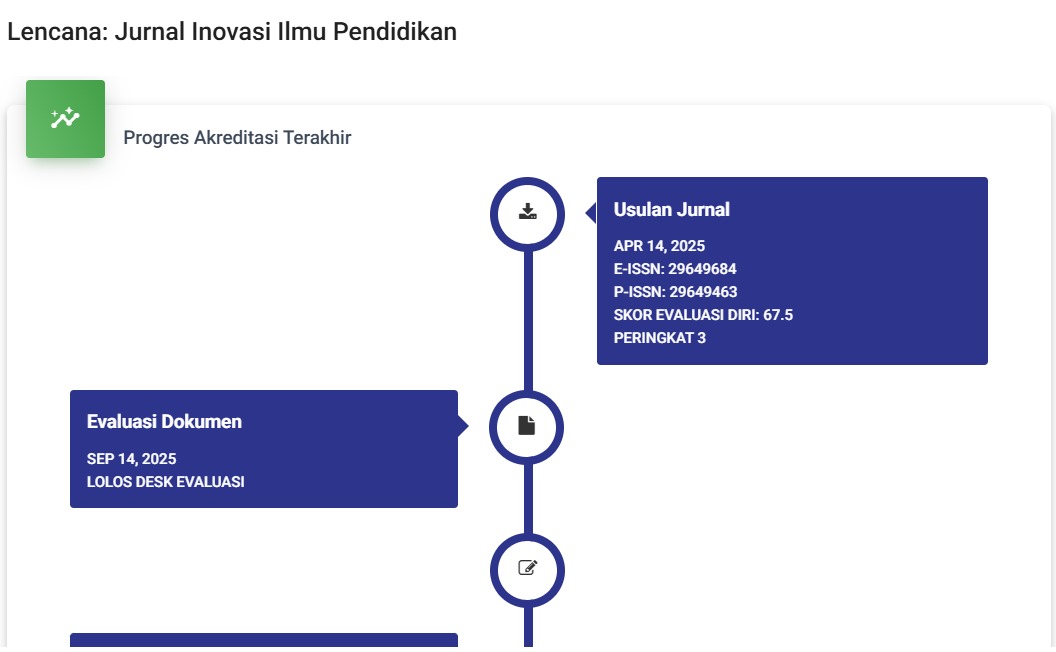Mengoptimalkan Hasil Belajar: Pengaruh Efikasi Diri dan Teman Sebaya pada Mahasiswa Universitas Negeri Jakarta
DOI:
https://doi.org/10.55606/lencana.v2i1.3061Keywords:
Learning Outcomes, Peers, Self-EfficacyAbstract
This research aims to determine and test the Influence of Self-Efficacy and Peer Influence on the Academic Achievement of Students at the State University of Jakarta. This study employs a quantitative research method with descriptive analysis, using a data collection method in the form of questionnaires. The subjects in this research were students from the Jakarta State University, totaling 121 students. This study uses data analysis techniques of the Outer Model with calculations for Convergent Reliability, Discriminant Validity, Composite Reliability, Cronbach's Alpha, and the Inner Model with calculations for T-statistics, R-Square, F-Square, and VIF using SmartPLS 4.0 software. The results of this research indicate that there is a positive and significant influence of self-efficacy on academic achievement with a t-statistic value of 4.124 > 1.96 and a significance value of 0.000 < 0.05. There is also a positive and significant influence of peer influence on academic achievement with a t-statistic value of 5.104 > 1.96 and a significance value of 0.000 < 0.05. The calculated F-Square for the self-efficacy variable on academic achievement is 0.365, and the F-Square for the peer influence variable on academic achievement is 0.173. This indicates that both Self-Efficacy and Peer Group have a positive and significant influence on the Academic Achievement of Students at the State University of Jakarta.
Downloads
References
Abdullah, P. M. (2015). Living in the world that is fit for habitation : CCI’s ecumenical and religious relationships. In Aswaja Pressindo.
Afrila, D. (2018). Pengaruh Pengalokasian Beasiswa Bidikmisi, Lingkungan Teman Sebaya, Dan Kebiasaan Belajar Terhadap Hasil Belajar Mahasiswa Bidikmisi Tahun Masuk 2011Di Universitas Negeri Padang. Jurnal Ilmiah DIKDAYA, 13–30. http://jurnal.unma.ac.id/index.php/th
Amin, N. F., Garancang, S., & Abunawas, K. (2023). KONSEP UMUM POPULASI DAN SAMPEL DALAM PENELITIAN. Jurnal Pilar, 14(1), 15–31.
Chemers, M. M., Hu, L. T., & Garcia, B. F. (2001). Academic self-efficacy and first-year college student performance and adjustment. Journal of Educational Psychology, 93(1), 55–64. https://doi.org/10.1037/0022-0663.93.1.55
Dakhi, A. S. (2020). Peningkatan Hasil Belajar Siswa. Jurnal Pendidikan Indonesia, 1(3), 350–361. https://doi.org/10.36418/japendi.v1i3.33
Ernilah, E., Toharudin, M., & Saefudin Wahid, F. (2022). Pengaruh Lingkungan Keluarga dan Teman Sebaya Terhadap Kecerdasan Emosional Siswa Sekolah Dasar. Jurnal Ilmiah KONTEKSTUAL, 3(02), 158–166. https://doi.org/10.46772/kontekstual.v3i02.665
Firmansyah, D. (2018). Pengaruh Strategi Pembelajaran Dan Gaya Belajar Siswa Terhadap Hasil Belajar Matematika Siswa. Jurnal Teknologi Pendidikan (JTP), 11(1), 86. https://doi.org/10.24114/jtp.v11i1.11199
Maidiana. (2021). Penelitian Survey. ALACRITY : Journal of Education, 1(2), 20–29. https://doi.org/10.52121/alacrity.v1i2.23
Nana, D., & Elin, H. (2018). Memilih Metode Penelitian Yang Tepat: Bagi Penelitian Bidang Ilmu Manajemen. Jurnal Ekonologi Ilmu Manajemen, 5(1), 288. https://jurnal.unigal.ac.id/index.php/ekonologi/article/view/1359
Nasution, N. C. (2018). DUKUNGAN TEMAN SEBAYA DALAM MENINGKATKAN MOTIVASI BELAJAR. https://core.ac.uk/reader/236210820
Purwanto, F. X. A. (2016). Pengaruh Efikasi Diri, Pengetahuan Kewirausahaan, dan Motivasi Berwirausaha terhadap Minat Mahasiswa Berwirausaha. Aplikasi Pelayaran Dan Kepelabuhan, 6(2), 104–127.
Rezeki, S., Yuliyani, R., & Tama, B. J. (2023). Pengaruh efikasi diri terhadap hasil belajar mahasiswa pada matakuliah metode numerik. Jurnal Theorems (The Original Reasearch Of Mathematics), 8(1), 52–61. http://jurnal.unma.ac.id/index.php/th
Robbins, S. P., Judge, T. A., & Millett, B. (2015). Organizational Behavior. https://books.google.co.id/books?hl=id&lr=&id=BzTiBAAAQBAJ&oi=fnd&pg=PP1&dq=Robbins,+S.+P.+And+Judge,+T.+A.+(2015).+Organizational+Behavior&ots=gScB_A4ZSX&sig=LW7EedVFjTOjaBzkaeMGi9AGEls&redir_esc=y#v=onepage&q&f=false
Sinaga, D. (2014). Statistik Dasar.
Sufirmansyah. (2015). PENGARUH EFIKASI DIRI TERHADAP PRESTASI BELAJAR MAHASISWA PASCASARJANA PRODI PAI STAIN KEDIRI DENGAN MOTIVASI SEBAGAI VARIABEL INTERVENING. 3(2), 133–156. http://dx.doi.org/10.30762/didaktika.v3i2.166
Suprihatin, S. (2017). PENGGARUH MODEL PEMBELAJARAN JIGSAW TERHADAP HASIL BELAJAR STUDI MASYARAKAT INDONESIA MAHASISWA. Pendidikan Ekonomi UM Metro, 5(1), 37–46.
Syahrudin. (2019). Pengaruh efikasi diri dan dukungan sosial teman sebaya terhadap prestasi belajar. Cognicia, 7(4), 507–526. https://doi.org/10.22219/cognicia.v7i4.10294
Taherdoost, H. (2016). Sampling Methods in Research Methodology ; How to Choose a Sampling Technique for Research. International Journal of Academic Research in Management (IJARM), 5(2), 18–27.
Tambun, S., Heryanto, H., Mulyadi, M., Sitorus, R. R., & Putra, R. R. (2022). Pelatihan Aplikasi Olah Data SmartPLS untuk Meningkatkan Skill Penelitian bagi Dosen Sekolah Tinggi Theologia Batam. Jurnal Pengabdian UNDIKMA, 3(2), 233. https://doi.org/10.33394/jpu.v3i2.5519
Yanti, Y., & Marimin. (2017). Pengaruh Motivasi, Lingkungan Keluarga, Dan Teman Sebaya Terhadap Kedisiplinan Siswa. Economic Education Analysis Journal, 6(2), 329–338.
Downloads
Published
How to Cite
Issue
Section
License
Copyright (c) 2023 Lencana: Jurnal Inovasi Ilmu Pendidikan

This work is licensed under a Creative Commons Attribution-NonCommercial-ShareAlike 4.0 International License.








